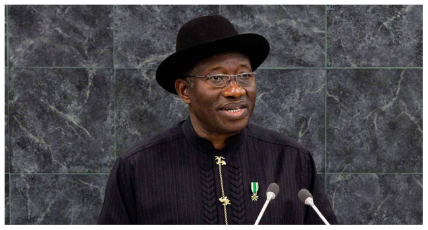FORMER President Goodluck Jonathan has described the former Attorney-General of the Federation (AGF) and Minister of Justice, Mohammed Bello Adoke, as a man who was relentlessly hunted across the world in the aftermath of the controversial OPL 245 oil deal.
Jonathan made this declaration in Abuja on Thursday at the public presentation of Adoke’s memoir titled “OPL 245: Inside Story of the $1.3 Billion Nigerian Oil Block.” The book provides Adoke’s personal account of the legal, political, and international dimensions of the controversial transaction that dominated headlines for over a decade.
Delivering his remarks through a representative, former Senate President Pius Anyim, Jonathan lamented what he described as the political persecution of key figures from his administration shortly after he left office in 2015.
“The author of this memoir, Mr. Bello Adoke, was the Attorney-General of the Federation at that time. He was hunted across the globe,” Jonathan said.
“But today, he is alive, he is healthy, and he is here to tell his story. Let me, therefore, use this occasion to congratulate Mr. Bello Adoke, my friend and my brother, for his doggedness and to say that I am pleased to join you in celebrating this victory.”
The former president said the OPL 245 saga often referred to as one of Nigeria’s most complex oil-related legal battles was politicized and weaponized by the succeeding administration, which, according to him, initiated what many perceived as a manhunt against prominent officials of his government.
Jonathan praised Adoke’s decision to publish the memoir, calling it a courageous and necessary act to defend the truth and contribute to Nigeria’s national discourse on justice and governance.
The essence of the author’s effort in documenting his memoir is not only to put the record straight but to contribute to the cause of truth and justice as the foremost pillars of nation building,” he said.
He stressed the need for public officials to always act in line with justice and fairness, adding that “any society or organisation that does not promote justice and fairness will neither have peace nor make progress.”
“Let me also remind all of us that power belongs to God,” he continued. “The best anyone who is blessed with the opportunity of holding public office should do is to commit to the assignment and use the opportunity to uphold truth, justice, and fairness.”
Jonathan concluded his remarks by commending Adoke for having the “wisdom and courage” to write his version of the controversial events that shaped a significant part of Nigeria’s legal and political history.
The oil prospecting license known as OPL 245, one of Nigeria’s most lucrative offshore oil blocks, was originally awarded in 1998 to Malabu Oil and Gas Ltd, a company linked to former Petroleum Minister Dan Etete, under the Sani Abacha regime and it was widely believed that the Late Abacha didn’t even know about the link of Etete and the firm.
Years later, in 2011, during Jonathan’s presidency, Malabu sold its rights to the block to oil giants Shell and Eni for $1.1 billion, with an additional $210 million paid to the Nigerian government as a signature bonus.
The transaction sparked widespread international investigations across multiple jurisdictions, including Italy, the UK, and the United States, over allegations of corruption, bribery, and money laundering.
Although the companies have consistently denied wrongdoing, and some courts have acquitted the firms or dismissed cases, the deal has continued to cast a long shadow over successive Nigerian administrations.
Adoke, who played a central legal role in facilitating the transaction during his time as AGF, has insisted he acted within the law and followed due process.
Following the end of Jonathan’s administration, Adoke became the subject of investigations by Nigeria’s anti-graft agencies and faced charges both domestically and internationally.
He was even declared wanted at one point, detained in the UAE, and later repatriated to Nigeria to face prosecution.
In “OPL 245: Inside Story of the $1.3 Billion Nigerian Oil Block”, Adoke provides what he calls a comprehensive narrative aimed at debunking misinformation, defending his actions, and setting the record straight.
The memoir is already stirring debate in legal and political circles, as it pulls back the curtain on what he describes as the intersection of law, politics, and vengeance.







